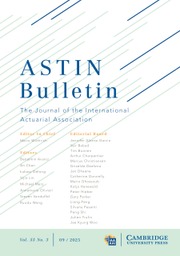Crossref Citations
This article has been cited by the following publications. This list is generated based on data provided by
Crossref.
Chavez-Demoulin, V.
Embrechts, P.
and
Nešlehová, J.
2006.
Quantitative models for operational risk: Extremes, dependence and aggregation.
Journal of Banking & Finance,
Vol. 30,
Issue. 10,
p.
2635.
Straßburger, Doreen
2007.
Risikomessung unter Solvency II.
Zeitschrift für die gesamte Versicherungswissenschaft,
Vol. 96,
Issue. S1,
p.
1.
Bäuerle, Nicole
and
Grübel, Rudolf
2008.
Multivariate risk processes with interacting intensities.
Advances in Applied Probability,
Vol. 40,
Issue. 2,
p.
578.
Itoh, Yuki
2009.
Recovery Process Model for Two Companies.
SSRN Electronic Journal,
Asimit, Alexandru V.
Furman, Edward
and
Vernic, Raluca
2010.
On a multivariate Pareto distribution.
Insurance: Mathematics and Economics,
Vol. 46,
Issue. 2,
p.
308.
Furman, Edward
and
Landsman, Zinoviy
2010.
Multivariate Tweedie distributions and some related capital-at-risk analyses.
Insurance: Mathematics and Economics,
Vol. 46,
Issue. 2,
p.
351.
Chavez‐Demoulin, Valérie
and
Embrechts, Paul
2010.
Encyclopedia of Quantitative Finance.
Bäuerle, Nicole
and
Blatter, Anja
2011.
Optimal control and dependence modeling of insurance portfolios with Lévy dynamics.
Insurance: Mathematics and Economics,
Vol. 48,
Issue. 3,
p.
398.
Grübel, Rudolf
and
Wegener, Hendrik
2011.
Matchmaking and Testing for Exponentiality in the M/G/∞ Queue.
Journal of Applied Probability,
Vol. 48,
Issue. 01,
p.
131.
Ramasubramanian, S.
2011.
Multidimensional Insurance Model with Risk-Reducing Treaty.
Stochastic Models,
Vol. 27,
Issue. 3,
p.
363.
Rosenbaum, Robert
and
Josić, Krešimir
2011.
Membrane potential and spike train statistics depend distinctly on input statistics.
Physical Review E,
Vol. 84,
Issue. 5,
Avanzi, Benjamin
Cassar, Luke Cameron
and
Wong, Bernard
2011.
Modelling Dependence in Insurance Claims Processes with Lévy Copulas.
SSRN Electronic Journal,
Reimer, Imke C.G.
Staude, Benjamin
Ehm, Werner
and
Rotter, Stefan
2012.
Modeling and analyzing higher-order correlations in non-Poissonian spike trains.
Journal of Neuroscience Methods,
Vol. 208,
Issue. 1,
p.
18.
Jang, Jiwook
and
Fu, Genyuan
2012.
Measuring Tail Dependence for Aggregate Collateral Losses Using Bivariate Compound Shot-Noise Cox Process.
Applied Mathematics,
Vol. 03,
Issue. 12,
p.
2191.
Anastasiadis, Simon
and
Chukova, Stefanka
2012.
Multivariate insurance models: An overview.
Insurance: Mathematics and Economics,
Vol. 51,
Issue. 1,
p.
222.
Bunge, John
Willis, Amy
and
Walsh, Fiona
2014.
Estimating the Number of Species in Microbial Diversity Studies.
Annual Review of Statistics and Its Application,
Vol. 1,
Issue. 1,
p.
427.
Abaurrea, J.
Asín, J.
and
Cebrián, A. C.
2015.
Modeling and projecting the occurrence of bivariate extreme heat events using a non-homogeneous common Poisson shock process.
Stochastic Environmental Research and Risk Assessment,
Vol. 29,
Issue. 1,
p.
309.
Bae, Taehan
and
Kreinin, Alex
2017.
A backward construction and simulation of correlated Poisson processes.
Journal of Statistical Computation and Simulation,
Vol. 87,
Issue. 8,
p.
1593.
Veraart, Almut
2018.
Modelling, Simulation and Inference for Multivariate Time Series of Counts Using Trawl Processes.
SSRN Electronic Journal ,
Veraart, Almut E.D.
2019.
Modeling, simulation and inference for multivariate time series of counts using trawl processes.
Journal of Multivariate Analysis,
Vol. 169,
Issue. ,
p.
110.

